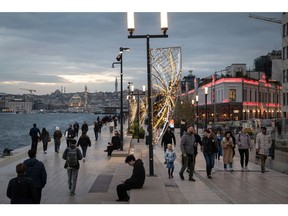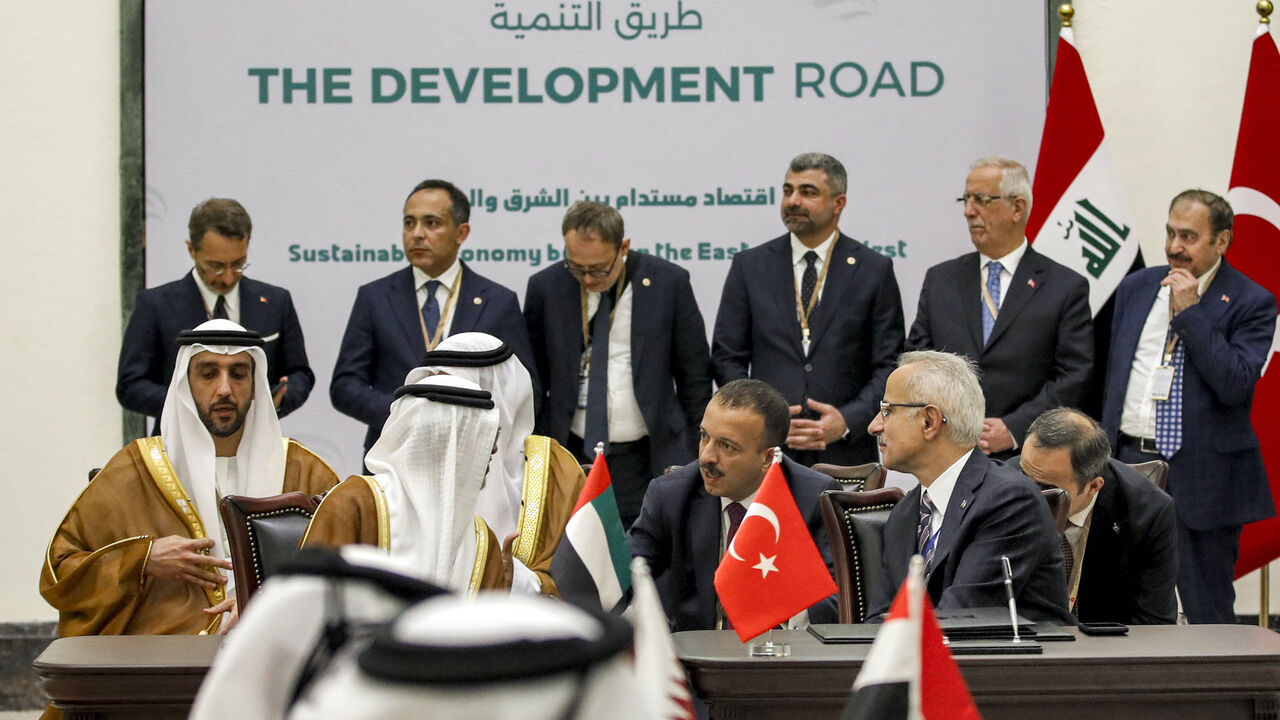Turkey will host a four-way summit with Iraq, Qatar and the United Arab Emirates on Aug. 29 to discuss an ambitious multi-billion-dollar project to connect the Iraqi port of Basra on the Persian Gulf to Turkey and beyond, Turkish Transport and Infrastructure Minister Abdulkadir Uraloglu said on Friday.
The meeting will bring together relevant ministers from all three states at the Dolmabahce Palace, home to the last Ottoman sultan, where “significant decisions” will be made, Uraroglu told Turkish state broadcaster TRT. Qatar and the UAE are potential investors in the project.
The meeting will bring together relevant ministers from all three states at the Dolmabahce Palace, home to the last Ottoman sultan, where “significant decisions” will be made, Uraroglu told Turkish state broadcaster TRT. Qatar and the UAE are potential investors in the project.
The estimated $20 billion project was formalized during Turkish President Recep Tayyip Erdogan’s official visit in April to Baghdad and will link the al-Faw port in Basra that is currently under construction to Turkey via a 1,275-kilometer (792-mile) rail and road network.
- Abu Dhabi’s AD Ports Group has inked a preliminary deal with Iraq’s General Company for Ports of Iraq to develop al-Faw and its planned economic zone.
Turkey Hosts Gulf Nations in $20 Billion Bid for New Trade Route
Turkey is hosting transport ministers from Iraq, Qatar and the United Arab Emirates in Istanbul on Thursday to discuss building an estimated $20 billion trade route connecting the Persian Gulf to Europe.

Article content
(Bloomberg) — Turkey is hosting transport ministers from Iraq, Qatar and the United Arab Emirates in Istanbul on Thursday to discuss building an estimated $20 billion trade route connecting the Persian Gulf to Europe.Turkish President Recep Tayyip Erdogan is seeking financing from the UAE and Qatar to build a rail and road network from Iraq’s Faw port on the Persian Gulf to its northern border with Turkey and a railway across Istanbul’s Bosphorus Strait bridging Europe and Asia.
The UAE has previously said it’s interested in investments in Turkey’s logistics, energy, tourism and agriculture sectors, without specifying individual projects.
Once a stop on the ancient Silk Road, Turkey is vying to become a conduit for exports to Europe amid growing competition over trade routes as China builds its own influence across the energy-rich Middle East.
“The Development Road will support the sustainability of global trade by diversifying international trade corridors,” Turkey’s state-run TRT television cited Transportation Minister Abdulkadir Uraloglu as saying last Friday. “Turkey will strengthen its economic and strategic advantages by creating a reliable and effective trade corridor between Asia and Europe.”
According to estimates, the new route could reduce transport times between Shanghai and Rotterdam from 33 days to 15 days, offering an alternative to the Suez Canal.
- Turkish academic Nejat Tamzok emphasized the strategic importance of the project in a recent essay for Eurasia Review, noting, “The Development Road includes not only transportation infrastructure but also energy transmission and communication lines. It’s expected to offer a faster trade route between China and Europe.”
- However, Tamzok pointed out that the project faces stiff competition from other global initiatives, including China’s Belt and Road Initiative and the US-backed India-Middle East-Europe Economic Corridor.
- Iran, too, has rival plans to develop its ports as regional trade hubs, which could challenge the success of the Development Road.
Moreover, the report affirmed that the upcoming summit follows a series of diplomatic efforts between Iraq and Turkiye aimed at improving bilateral relations.
- Erdogan’s visit to Baghdad, his first in 14 years, resulted in agreements on energy, trade, and water-sharing.
- Last week, Turkiye and Iraq also signed a “historic” military cooperation agreement, further strengthening ties between the two nations.
However, analysts remain cautious about the long-term prospects of Turkish-Iraqi cooperation.
“Turkiye and Iraq have signed numerous agreements in the past, but many of them have not been fully implemented,” said Arzu Yilmaz, an associate professor at the University of Kurdistan Hewler in Erbil.
- Yilmaz expressed skepticism about the viability of the Development Road, particularly given the unresolved issues surrounding the existing Kirkuk-Yumurtalik oil pipeline, which has been closed since March 2023 following an international court ruling against Turkiye.








No comments:
Post a Comment